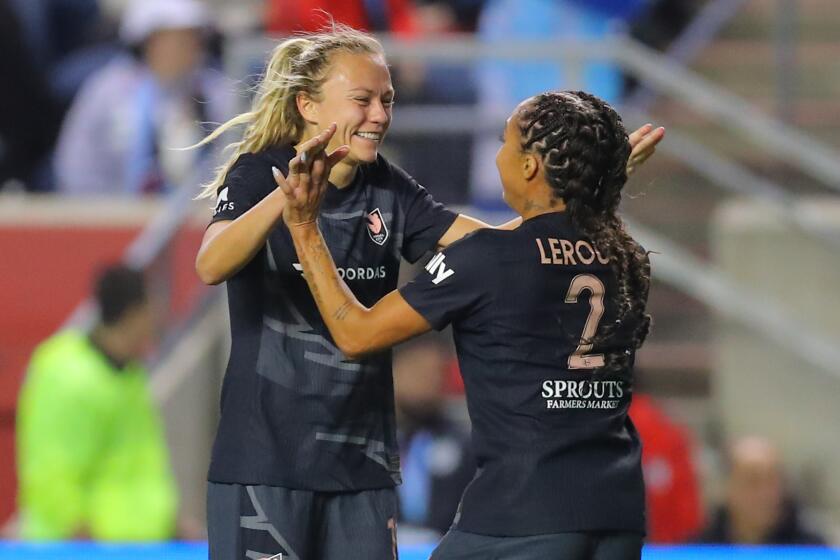World Cup does well in TV ratings for ESPN
This month’s World Cup in South Africa has soared to some of the best U.S. TV ratings since the tournament was held in Chicago 16 years ago. But fans hoping for a concurrent boost in the stateside popularity of soccer should hold off blowing their vuvuzelas just yet.
Saturday’s match between the U.S. and England on ABC and the Spanish-language network Univision scored an average of 14.5 million viewers, making it the most-watched first-round contest in the history of World Cup telecasts in America, according to the Nielsen Co. Through the first eight matches, the series averaged 3 million viewers on ESPN and ABC, for a hefty 75% rise over the 2006 games in Germany. (By comparison, this month’s NBA Finals on ABC have averaged 16.2 million viewers over five games, with Sunday’s Lakers-Celtics game 5 the most watched matchup.)
Nearly 1.3 million viewers have also watched live and replay matches on ESPN3.com, officials said.
The numbers represent a big payoff for Walt Disney Co., the corporate parent of ESPN and ABC, which has heavily promoted the games on TV and online.
“We have unprecedented interest in the United States,” ESPN Executive Vice President John Skipper said earlier this week in a conference call from South Africa, where the clamorous sound of fans blasting on vuvuzelas, the stadium horns that sometimes drown out announcers on the air, has become a minor controversy. “We have had the strategy of trying to get America to understand that this is a worldwide event.”
Skipper said that youth leagues have helped expand the appeal of soccer, a worldwide TV phenomenon that Americans have been slow to warm to. Now ESPN is working with soccer officials on plans to strengthen U.S. viewership of games once the World Cup is over.
“It’s going to take a few more years, but we’re going to present soccer as a year-round, domestic and international sport on our air, across all platforms,” Skipper said.
But Lisa M. Burns, a sports broadcasting expert and associate professor of media studies at Quinnipiac University in Connecticut, remains skeptical that soccer will become a regular fixture of the American sports TV landscape anytime soon.
“The thing that hurts soccer’s popularity here in the U.S. is the fact that it isn’t TV-friendly,” Burns said. “It isn’t designed for TV timeouts like U.S. sports, many of which have modified their rules over the years to accommodate television advertising. This keeps the major broadcast networks and advertisers from investing in” telecasts of Major League Soccer, the U.S. entity formed to enhance the bid to host the 1994 World Cup.
Andrew C. Billings, a Clemson University professor who studies sports media, said that Americans have had to play catch-up with other countries’ intense soccer cultures. Even World Cup ratings, he added, will likely be dependent on how the U.S. team ultimately fares.
“At least from a ratings standpoint, national sports events generally do better than international ones unless American athletes are major parts of the story,” Billings said. “Tennis is a perfect example of a sport that used to have dynamic American players dominating the game and now has a relative dearth of American players excelling. The result has been lower ratings even when some of the best international rivalries of recent years” — such as Roger Federer versus Rafael Nadal, considered by some the greatest rivalry in tennis history —”should be quite compelling.”
Meanwhile, in delivering the World Cup, ESPN has been caught between two constituencies, the casual viewers who can help broaden the game’s appeal and the hard-core fans who scorn as patronizing any attempts to explain basic rules or otherwise make soccer palatable to non-initiates.
“We want to appear authentic in our presentation,” ESPN’s Skipper said, adding that the channel attempts to strike a balance: “We’re assuming the fans watching know the game. That doesn’t mean they know the players from the Cameroon team or know the history of how that team has done in the World Cup.”
Part of that authenticity: Preserving the sound of those vuvuzelas, even if sometimes the network tweaks the audio feed to make the noise a bit less audible. ESPN does the same thing, Skipper hastened to add, with the roar of the engines during its NASCAR telecasts.
“It’s part of the culture here,” Skipper said of South Africa. “We accept it and applaud it.”







